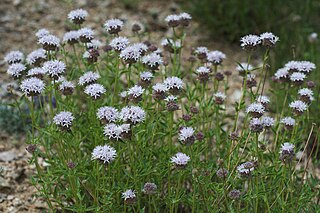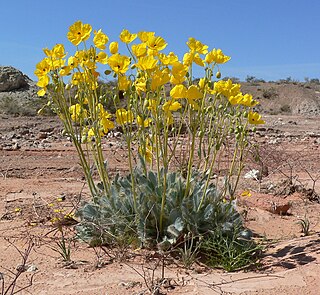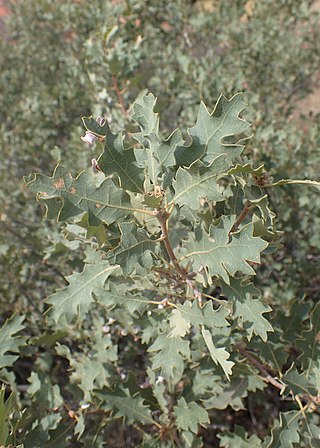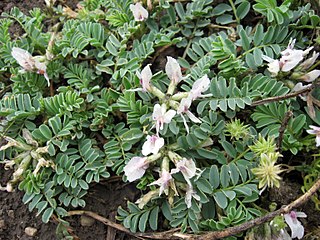Related Research Articles

James Lauritz Reveal was a U.S. botanist best known for his contributions to the genus Eriogonum and for his work on suprageneric names. His website, at PlantSystematics.org, also presents material on plant taxonomy including the Reveal system. He published extensively on North American flora, was a member of the Angiosperm Phylogeny Group, and was one of the authors of the APG II and APG III classifications.

Monardella odoratissima is a perennial flowering plant which grows in mountain forests and sagebrush scrub. It is a member of the mint family (Lamiaceae). It has the minty odor characteristic of this family.

Croton californicus is a species of croton known by the common name California croton. This plant is native to California, Nevada, Utah, Arizona, and Baja California, where it grows in the deserts and along the coastline.
Horace Mann Jr. was an American botanist, son of Horace Mann. His mother was one of the famous Peabody Sisters Mary Tyler Peabody Mann. Mentored in botany by Henry David Thoreau, whom he accompanied on an expedition to Minnesota, Mann took classes in zoology with Louis Agassiz and assisted William Tufts Brigham botanize the Hawaiian Islands. Mann was to have headed the botanical garden at Harvard, but died of tuberculosis at age twenty-four. His own herbarium was purchased by Cornell University and became the basis of that university's collection. He is credited with the discovery of more than 100 species.
Grant Revon Underwood is a historian of the Church of Jesus Christ of Latter-day Saints and a professor at Brigham Young University (BYU). He is also the author of The Millennial World of Early Mormonism and the editor of Voyages of Faith: Explorations in Mormon Pacific History.

Arctomecon californica is a species of poppy known by several common names, including California bearpoppy, Las Vegas bearpoppy, golden bearpoppy, and yellow-flowered desert poppy. It is a perennial herb that is native to the eastern Mojave Desert.

Aquilegia grahamii is a species of flowering plant in the buttercup family known by the common name Graham's columbine. It is endemic to Utah in the United States, where it is known only from Uintah County. It occurs in three canyons along the Uinta Mountains. There are an estimated 5,000 to 10,000 individuals.

Packera musiniensis is a rare species of flowering plant in the aster family known by the common names Musinea ragwort and Musinea groundsel. It is endemic to Utah in the United States, where it is known only from Sanpete County in the Manti-La Sal National Forest.

Leymus ambiguus is a species of grass known by the common names Colorado wildrye and Rocky Mountain wildrye. It is native to the Rocky Mountains of the United States, growing mainly on rocky hillsides on the eastern slopes of the mountains in Colorado and New Mexico; it has also been reported from Utah. It is a climax species on the dry grasslands of the Colorado Front Range.

Tetraneuris acaulis is a North American species of flowering plants in the sunflower family. Common names include angelita daisy, stemless four-nerve daisy, stemless hymenoxys, butte marigold, and stemless rubberweed.

Stutzia is a plant genus in the subfamily Chenopodioideae of the family Amaranthaceae. It was described in 2010, replacing the illegitimate name Endolepis. It comprises two species, that have also been included in the genus Atriplex.
Phacelia cronquistiana is a plant species native to Utah and Arizona, known only from Kane and Mohave Counties. It occurs in sagebrush and Pinus ponderosa forests at elevations of 1,900–2,100 m (6,200–6,900 ft).
Penstemon franklinii, or Franklin's penstemon, is a plant species endemic to Utah, United States, known only from Cedar Valley in Iron County. It grows in grasslands and in sagebrush communities.
Camissonia bairdii is a plant species endemic to Washington County, Utah. It occurs in clay soil in pinyon-juniper woodlands. The species is classified as critically imperiled.

Quercus welshii, the wavy leaf oak, shinnery oak, or Tucker oak, is a North American species of shrub in the found in the Colorado Plateau and Canyonlands region of the southwestern United States.
Erigeron goodrichii is a rare species of flowering plant in the family Asteraceae known by the common name Uinta Mountain fleabane.
Gutierrezia petradoria is a species of flowering plant in the family Asteraceae known by the common names San Pedro snakeweed and goldenrod snakeweed

Astragalus utahensis, commonly called the Utah milkvetch, is a species of plant in the legume family.

Astragalus cibarius, commonly called the browse milkvetch, is a species of plant in the legume family.
Geraldine Anne Allen is a botanist, professor of biology, and herbarium curator at the University of Victoria in British Columbia, Canada. She obtained formal education at the University of British Columbia and Oregon State University, earning a Doctor of Philosophy degree in botany and plant pathology from the latter in 1981. During her career, she has authored or co-authored over 50 publications, including genera chapters for Flora of North America and the Jepson Manual. She also has authored several species of the Erythronium genus.
References
- ↑ Brigham Young University. S. L. Welsh Herbarium - Vascular Plants Archived February 6, 2010, at the Wayback Machine
- ↑ "Oregon State University".
- ↑ International Plant Names Index. S.L.Welsh.